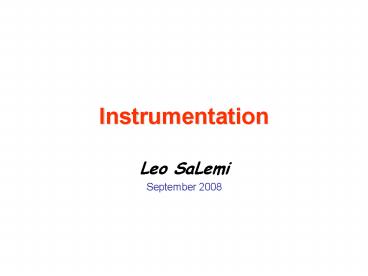Instrumentation PowerPoint PPT Presentation
1 / 22
Title: Instrumentation
1
Instrumentation
- Leo SaLemi
- September 2008
2
What is it?
- Definitions of Instrumentation from the Web
- The use of rods, screws, plates, hooks, wires,
bolts, etc. to correct and stabilize
abnormalities of the spine. - The art of composing, orchestrating, or arranging
for an instrumental ensemble. - An electrical or pneumatic device placed in the
field to provide measurement and/or control
capabilities for the system.
3
Objectives for this course
- Learning the fundamentals of industrial
instrumentation - Terminology and Symbols
- Measuring Means
- Pressure, Temperature, Level, Flow
- Controlling Means
- Simple Closed Loop Control
- PID Loop tuning
4
Resources
- Text Book
- Industrial Control Electronics 3rd edition by
Terry Bartelt, - Published by Thompson (Delmar Learning)
- ISBN 1 4018 6292 6
- ISA (Instrumentation, Systems, and Automation
Society) The International Society for Automation
- Setting the Standard for Automation - www.isatoronto.org
- Other web links see notes
5
Automation Technology
- Instrumentation plays an important role in almost
every aspect of Automation Technology. - Industrial Automation
- Manufacturing Automation
- Process Automation
- Building Automation
- Everyone needs to measure and/or control
something and thats what instrumentation is
all about.
6
Measurement
- Things that are measured include
- Pressure, temperature, level, flow, humidity,
speed, motion, position, weight, density,
conductivity, pH, light, quality, quantity, and
more. - Devices that process or do the measuring are
called - Sensors, transducers, transmitters, indicators,
displays, recorders, data loggers, and data
acquisition systems.
7
Controllers
- These are the devices that do the controlling
- Programmable Logic Controllers (PLCs)
- Programmable Automation Controllers (PAC)
- Distributed Control Systems (DCS)
- Proportional, Integral, Derivative (PID)
Controllers - Supervisory Control and Data Acquisition (SCADA)
- Building Automation Controllers (BAC)
- Energy Management Systems (EMS)
8
Control Elements
- These are the devices the controller operates
- Pneumatic valves, solenoid valves, rotary valves,
motors, switches, relays, variable frequency
drives.
9
Overview of Process Automation
- The process is that portion of an automation
operation which use energy measurable by some
quality such as pressure, temperature, level,
flow, (and many others) to produce changes in
quality or quantity of some material or energy.
10
Example of a Temperature Process
The objective of this process is to maintain a
constant water bath temperature.
11
Temperature Process Terminology
This is a Temperature Process
The measuring means is the thermometer.
(Temperature Indicator- TI)
The process temperature is maintained at a
desired point (Set Point SP)
Steam (Control Agent) is used to vary the
temperature by opening and closing the control
valve (Final Control Element)
12
Level Process
The control objective is to maintain a constant
liquid level of oil inside the tank (e.g. 100
gallons /- 20 gallons). The hand valve is opened
and closed as required to maintain the desired
tank level.
13
Terminology used to describe the process
- PROCESS Level
- CONTROLLED VARIABLE Head pressure at bottom of
tank - CONTROL POINT The level of oil in the tank (Set
Point 100 gallons) - MEASURING MEANS Level Indicator (Head Pressure)
- CONTROL AGENT Volume of oil stock
- MANIPULATED VARIABLE Flow rate of oil (gpm)
14
Basic Model of a Process
- The process is maintained at the desired point
(SP) by changing the FCE based on the value of
the PV
Process equilibrium (balance) is when the input
energy maintains the output at a constant
desired point.
15
Basic Model of a Process
- The measuring means provides the standardized
signal that represents the condition of the
process, i.e. is the process at the desired point?
16
Measuring Means
17
Open Loop Control
- Open loop (or manual control) is used when very
little change occurs in the Process Variable (PV)
Corrective action is provided by manual feedback
18
Closed Loop Control
- Closed loop or feedback control provides a
corrective action based on the deviation between
the PV and the SP
SP
19
Controlling Means
- Controllers provide the required control action
to position the FCE at a point necessary to
maintain the PV at the desired SP. - PID (single loop feedback controller)
- DCS (distributed controllers)
- PLC (programmable logic controllers)
20
Single Loop Feedback Control
The TT provides the signal (PV) that represents
the condition of the process being controlled.
The TIC compares the PV to the SP and opens and
closes the FCE to maintain the process at
equilibrium.
- Measuring Means
- Controlling Means
- Final Control Element
- Temperature Process
21
Summary
- Process automation makes use of instrumentation
to maintain the process at some desired
condition. - Common instrumentation used in a process loop are
the measuring means (usually transmitters), the
controlling means (usually a PID controller), and
the Final Control Element (usually some type of
valve) - The measuring means provides the feedback signal
(PV) used in the process loop. The controlling
means operates the FCE based on the difference
between the PV and the SP. - Process equilibrium is maintained when the
difference between the PV and SP is zero or
constant (offset?)
22
NEXT?
What are transmitters?
What is PID?
What are PID symbols?
What types of FCE are there?
What am I doing here?
What is a?
Check out
How do I tune a loop?
FIC TT LRC PRV
How do I measure? Pressure Level Temperature Flow
Should I use a 3-15 psi or 4-20 mA valve?
What is Integral action?

